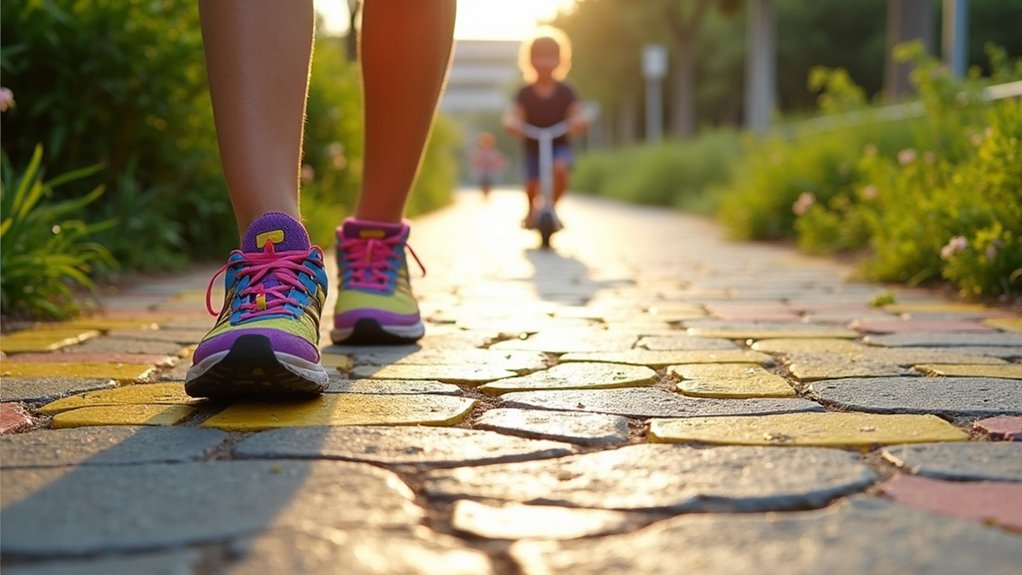Resin-bound walkways offer excellent grip and safety for pedestrians, much like walking on fine sandpaper rather than smooth concrete. The textured surface provides sure footing in typical British weather, from autumn drizzle to winter frost. Unlike traditional paving, these surfaces have no joints or gaps to trip over, and their porous nature means rainwater drains away quickly instead of forming slippery puddles. The material naturally deters moss and algae – common hazards on British pavements – keeping the surface safer year-round with minimal upkeep.
Key Takeaways
Resin-bound paths offer brilliant grip, keeping you steady whether it’s raining or dry. Think of them like trainers with good tread – they just work.
The smooth, continuous surface means no dodgy paving slabs to trip over. You won’t find those annoying gaps or loose bits that catch your feet.
The textured finish works a treat in British weather, giving proper grip even during our notorious downpours. It’s particularly helpful for anyone using walking sticks or pushchairs.
Unlike traditional paving, there are no joints or edges to catch wheels or walking aids – making it spot on for wheelchair users and parents with buggies.
The surface naturally drains water away, so you won’t find those pesky puddles that always seem to appear on concrete paths. Perfect for our rainy climate.
Enhanced Slip Resistance and Traction
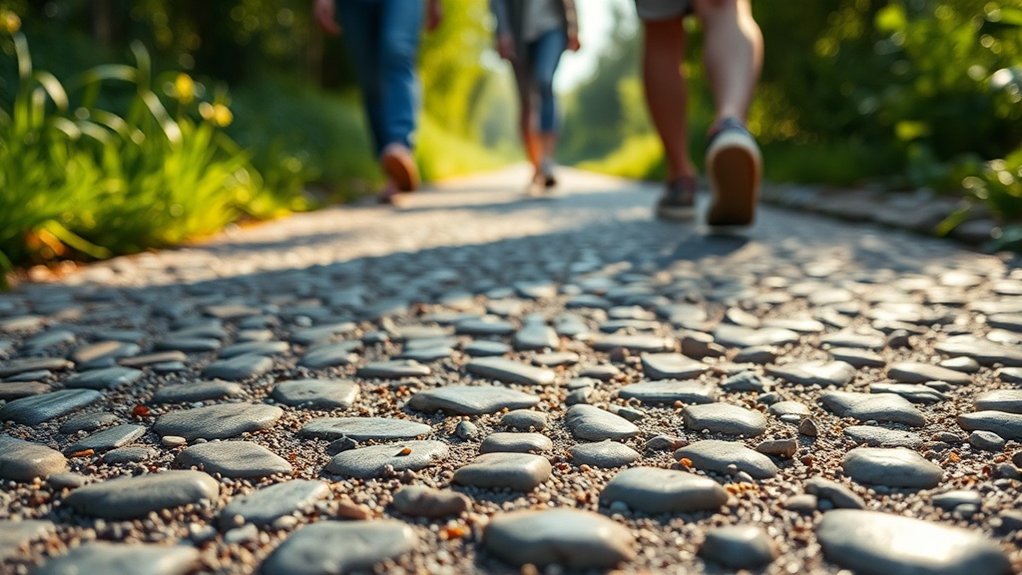
Resin-bound walkways offer excellent grip and slip resistance, making them much safer for pedestrians.
The natural stone aggregate creates a textured surface that provides better traction than traditional concrete or tarmac, particularly in wet weather. Tests show these surfaces maintain good grip year-round, and adding anti-slip materials to the resin mixture can further improve safety, especially on slopes or busy paths. This is largely due to the permeable design of resin-bound surfaces, which allows for effective water drainage and minimizes standing water. These practical additions don’t affect the walkway’s looks but make a real difference in preventing slips and falls. Regular maintenance, including inspections for slip resistance, can ensure that the surface remains safe and usable for all pedestrians.
Whether you’re pushing a pram up a slope or walking to your front door in the rain, resin-bound surfaces give you that extra bit of confidence underfoot.
Improved Permeability and Drainage
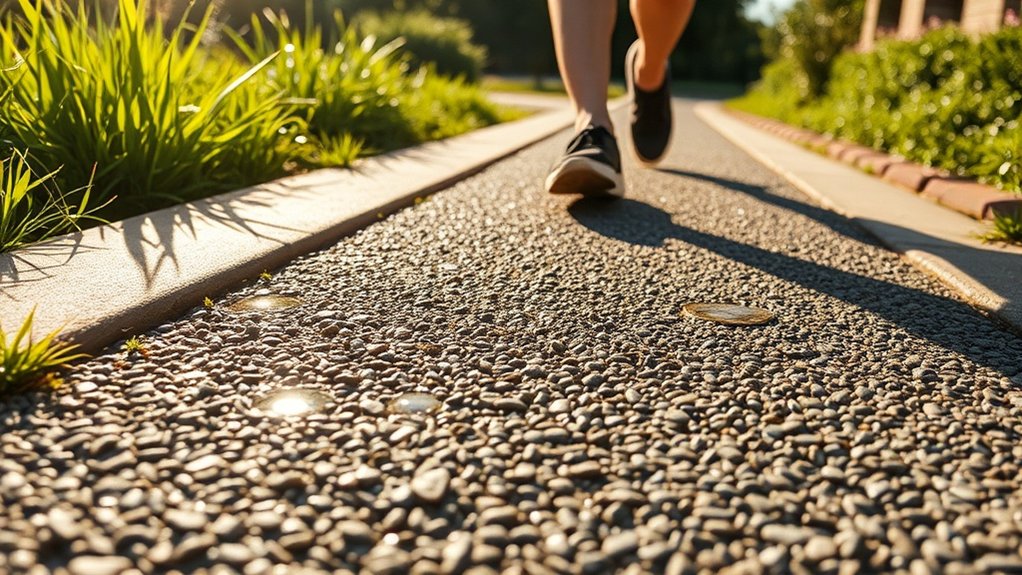
Resin-bound walkways offer superior permeability and drainage compared to traditional surfaces. The system allows rainwater to filter through gaps between stone aggregates, preventing puddles and surface water build-up. This design meets UK Sustainable Urban Drainage Systems (SUDS) requirements whilst helping replenish groundwater and reduce local flood risks. Additionally, the permeability of resin-bound surfaces ensures that water is efficiently managed, enhancing the overall safety of pedestrian walkways. This innovative approach to urban drainage mimics natural drainage patterns, allowing for better water management during heavy rainfall.
| Feature | Benefit |
|---|---|
| Natural aggregate composition | Promotes water infiltration |
| Open structure | Reduces flood risks |
| Multi-layer construction | Enhances drainage efficiency |
| Compliance with SUDS | Supports environmental management |
| Customizable for vegetation | Nourishes surrounding plants |
Proper installation ensures a practical, sustainable surface that works well in Britain’s wet climate. Think of it as a built-in drainage system – when it rains, water simply soaks through rather than forming puddles or running off into drains.
Seamless Surface for Trip Hazard Reduction
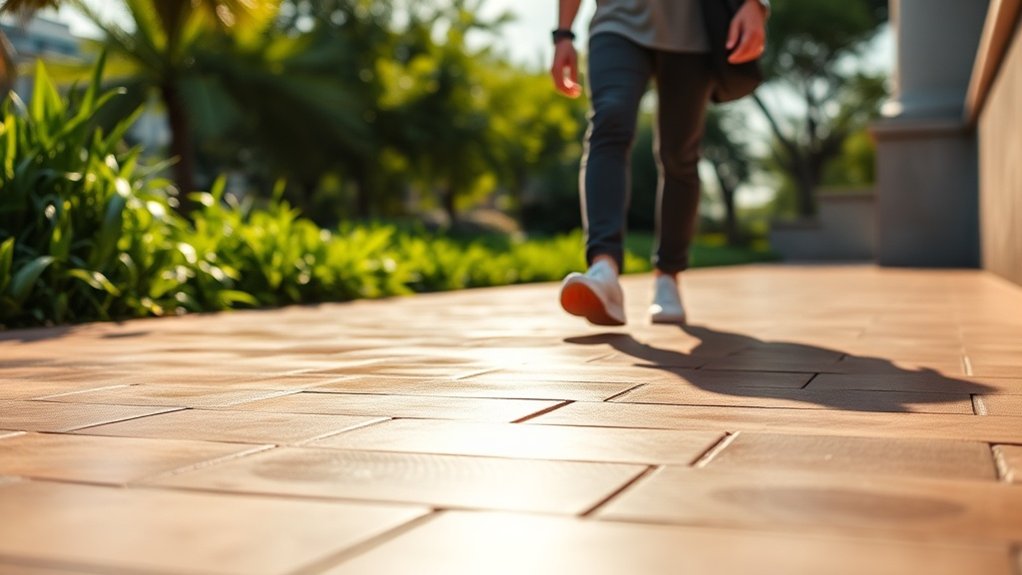
Seamless surfaces dramatically cut trip risks by doing away with the uneven levels and bumps you’d normally find in standard paths. The design tackles trip hazards head-on, making for safer movement. Worth noting:
- Level Throughout: No joints or gaps means trainers and walking aids won’t catch – rather like walking on a smooth gym floor.
- Even Surface: Think of it as a well-laid carpet – no sudden rises or dips to catch you out, particularly handy in busy spaces like shopping centres. Additionally, the natural texture created by embedded stones contributes to better grip, further enhancing pedestrian safety.
- Lasting Stability: Stone and resin mix stays firmly in place, unlike loose gravel paths that can shift about. The surface keeps its shape, much like a properly laid patio.
Resistance to Moss and Algae Growth
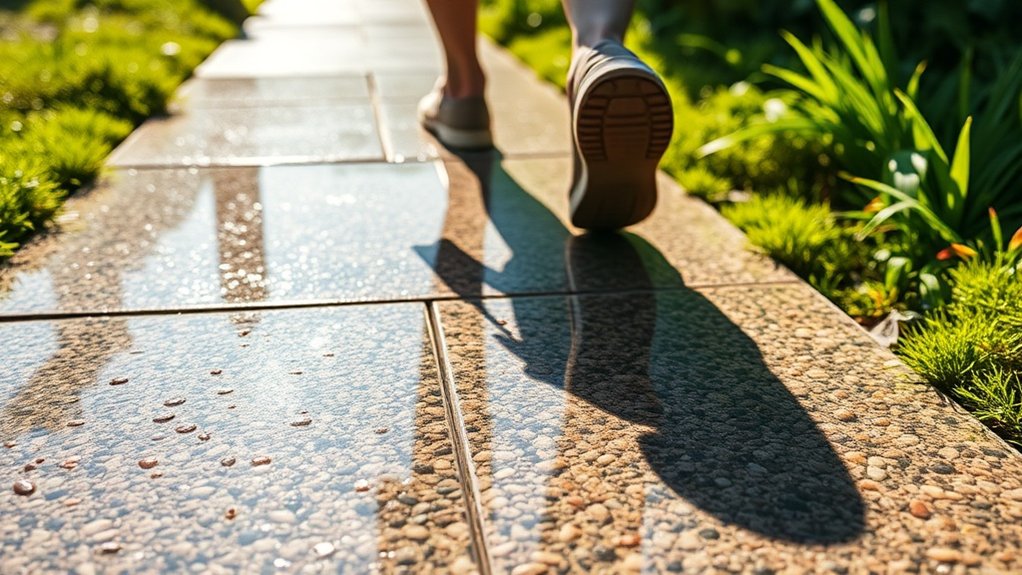
Resin-bound paths resist moss and algae buildup thanks to their structure and proper installation. The surface’s porous quality ensures quick water drainage, which stops moisture from lingering – a key factor in keeping moss and algae at bay.
Think of it like a well-draining garden bed versus a waterlogged patch.
Getting the base layer right is crucial. A porous foundation lets water flow through properly, whilst non-porous bases trap water and encourage unwanted growth.
The smooth, joint-free surface also blocks weeds from taking hold.
Regular maintenance is straightforward: sweep regularly and apply an appropriate biocide when needed. Regular inspections for small weeds also play a vital role in preventing their establishment.
Keep an eye on shaded areas and damp spots, as these tend to be trouble zones for moss and algae.
With these simple steps, your resin-bound path should stay clear and safe year-round.
Low Maintenance and Durability
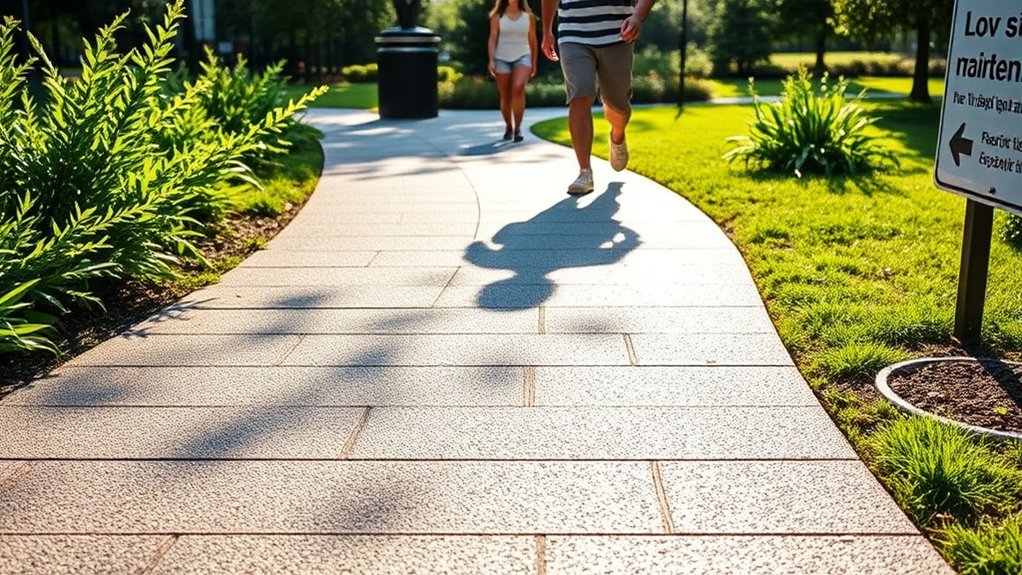
Low Maintenance and Durability
Resin-bound paths offer outstanding durability with minimal upkeep, making them a practical choice for British gardens and driveways.
Three key benefits stand out:
- Ease of Cleaning: A quick sweep and occasional blast with the pressure washer keeps the surface pristine – no fancy cleaning products needed.
- Resistance to Wear: The tough mix of resin and stones won’t crack or fade like traditional paving, even under typical British weather.
- Weed Suppression: Unlike block paving or gravel, the solid surface stops weeds from sprouting through, cutting down on garden maintenance time.
Compliance With Safety Standards
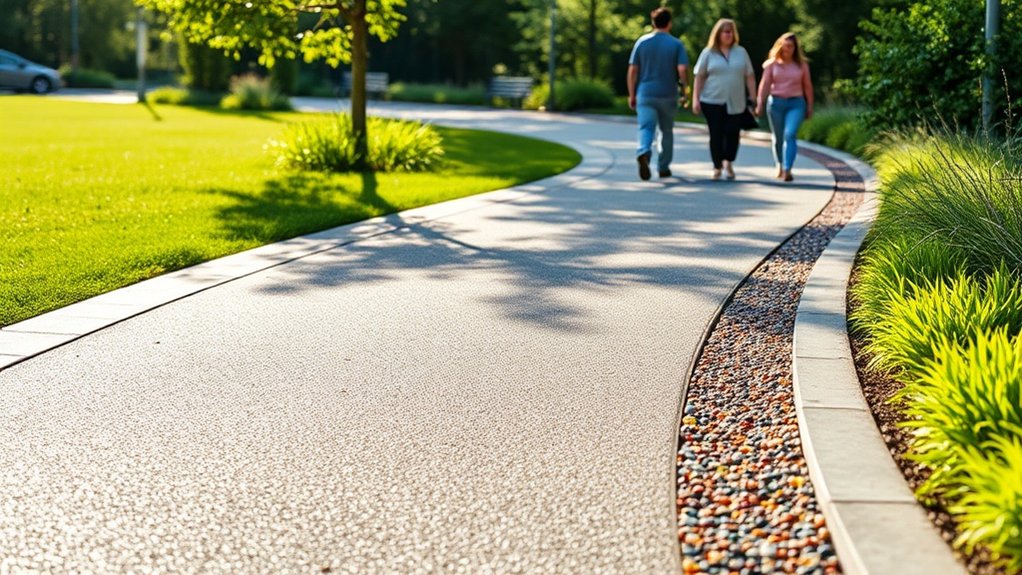
Installing resin-bound walkways in the UK demands strict adherence to safety standards – it’s not optional, but a legal must. Proper installation ensures surfaces meet British slip resistance requirements and drainage regulations.
Think of it like fitting a new kitchen: you wouldn’t skip building regulations, and the same applies here. These standards protect pedestrians whilst helping manage rainwater runoff, particularly important for Britain’s wet climate.
The rules also support sustainable construction practices, which are increasingly vital for UK building projects.
Meeting Regulatory Requirements
Meeting Regulatory Requirements
Proper compliance with UK safety standards is vital for resin-bound walkway installations. Three essential areas require attention:
- Training Programmes: Your installers must complete proper training for handling diisocyanates by August 2023. This legal requirement ensures safe material handling and proper installation techniques.
- Material Certification: Choose BBA-certified products for your installations, particularly for public spaces like school pathways or council developments. These certifications confirm the material’s durability and safety standards.
- SUDS Compliance: Your walkways must meet Sustainable Drainage Systems standards. Think permeable surfaces that let rainwater drain naturally, reducing local flood risks – particularly important in British weather conditions.
Keep documentation of all compliance measures, as local authorities may request proof during inspections or planning permission processes.
Enhancing Public Safety
Improving public safety with resin-bound walkways is straightforward and vital.
These surfaces offer excellent grip through their textured finish, which works brilliantly in Britain’s wet weather. Unlike loose gravel paths commonly seen in UK parks and schools, the seamless surface eliminates trip hazards.
The permeable nature means rainwater drains away quickly, preventing dangerous puddles and helping manage our frequent rainfall.
These paths handle heavy footfall well, from busy high streets to school playgrounds, and any damage can be fixed easily.
For local councils and property managers looking to boost safety, resin-bound walkways are a practical choice that keeps pedestrians safe year-round.
Environmental Compliance Benefits
Environmental Compliance Benefits
Resin-bound walkways are becoming vital in British towns and cities to meet environmental regulations whilst improving safety standards. These paths offer practical benefits for both councils and residents:
- SUDS Compliance: The permeable surface lets rainwater drain naturally, helping prevent local flooding – particularly useful during Britain’s wet seasons.
- Built to Last: The tough surface needs minimal upkeep, saving councils money and meeting safety rules without constant repairs.
- Safe in All Weather: Strong grip levels make these paths safe even in typical British weather, from rain to frost, meeting UK safety requirements.
The walkways work like a natural drainage system, much like garden soil, whilst being tough enough for daily foot traffic.
They’re particularly effective in places like housing estates and town centres where traditional concrete paths often cause drainage problems.
Benefits for High Foot Traffic Areas
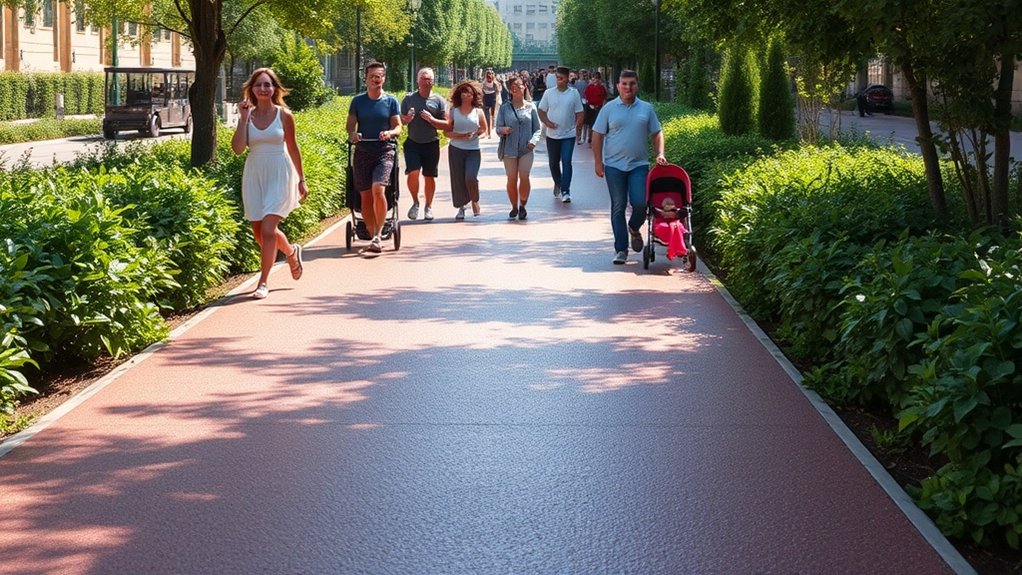
Benefits shine through in busy pedestrian zones with resin-bound surfaces.
The non-slip finish offers excellent grip, particularly useful on rainy British days, whilst proper drainage stops puddles from forming.
The smooth, joint-free surface means no loose edges to catch feet on – ideal for shoppers, commuters and tourists alike.
A practical choice for high-traffic spots like town centres, retail parks and school grounds.
Enhanced Grip Features
Enhanced Grip Features
Resin-bound walkways offer excellent grip in busy pedestrian areas, tackling common slip risks head-on. These practical surfaces combine modern materials with proven anti-slip technology for day-to-day safety.
Key benefits:
- Natural Texture: Embedded stones create a naturally rough surface, much like walking on fine gravel, giving solid grip even during British rainy spells.
- Seamless Surface: The even, gap-free finish means no trip hazards – ideal for pushchairs, wheelchairs and walking frames.
- Durable Slip Resistance: The surface keeps its grip through all seasons and actively prevents moss and algae build-up, common problems on standard paving.
These features make resin-bound surfaces a reliable choice for well-trafficked public spaces like shopping centres, school grounds and hospital pathways.
Effective Drainage Solutions
Resin-bound walkways offer excellent grip for safer walking whilst providing top-notch drainage, which is vital for busy paths and driveways.
The surface lets water seep through naturally, stopping puddles from forming and reducing water build-up. This clever design fits perfectly with UK planning guidelines and SUDS requirements, helping rainwater return to the ground naturally.
Think of it like a giant sponge – when it rains heavily, the water simply filters through rather than pooling on top. This means less chance of flooding and safer walking conditions, even in typical British weather.
Unlike concrete or tarmac, these surfaces handle water flow brilliantly and need less upkeep over time.
Better still, they help clean rainwater as it passes through, keeping our local streams and rivers cleaner.
For British homeowners and businesses looking for a practical, eco-friendly paving solution, resin-bound surfaces tick all the boxes.
Seamless Surface Design
Seamless surface design, whilst appearing a modest detail, proves vital for safety and accessibility in busy pedestrian areas.
The advantages of seamless resin-bound paths include:
- No Trip Risks: A smooth, uninterrupted surface stops people catching their feet on loose stones or gaps.
- Better Grip: Natural surface texture offers solid footing, particularly useful during Britain’s wet weather.
- Easy Upkeep: The non-porous finish keeps weeds and moss at bay, much like a well-sealed patio, ensuring safer walkways with minimal fuss.
Accessibility for All Users
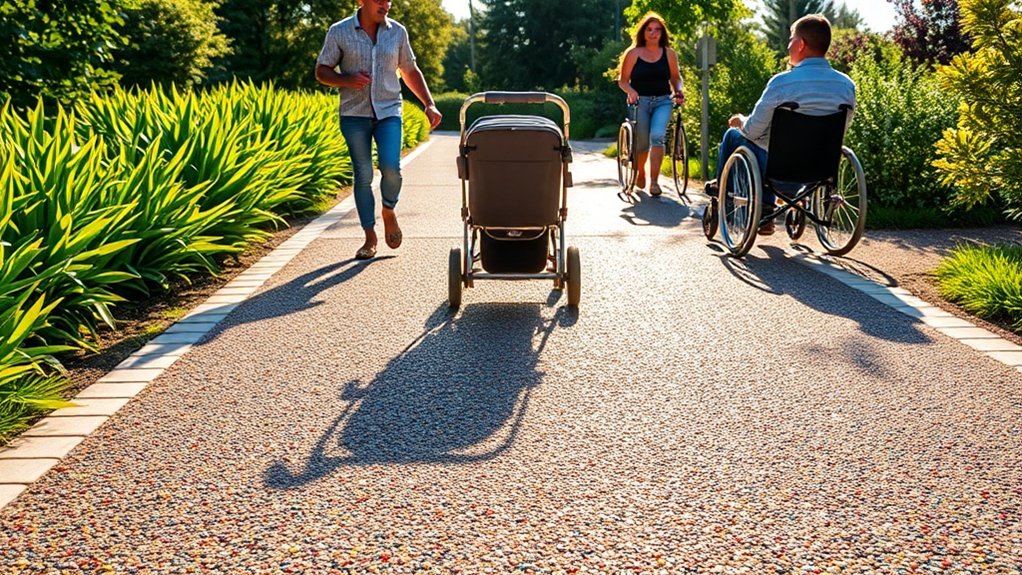
Resin-bound walkways offer essential accessibility benefits for everyone using public spaces across the UK. The smooth, joint-free surface prevents tripping and makes it particularly easy for wheelchair users, those with pushchairs, and people using mobility scooters to move about freely.
Its non-slip properties work well in Britain’s varied weather, from rain to frost, keeping pedestrians steady on their feet – especially important for older people and those less steady on their feet.
The paths can be built with gentle slopes that meet British accessibility standards, making it straightforward to navigate between different levels.
Because resin surfaces last so long with minimal upkeep, they remain safe and stable year after year. Whether it’s outside shops, in parks or around public buildings, these walkways help create spaces that truly work for everyone in the community.
Aesthetic Appeal and Customization
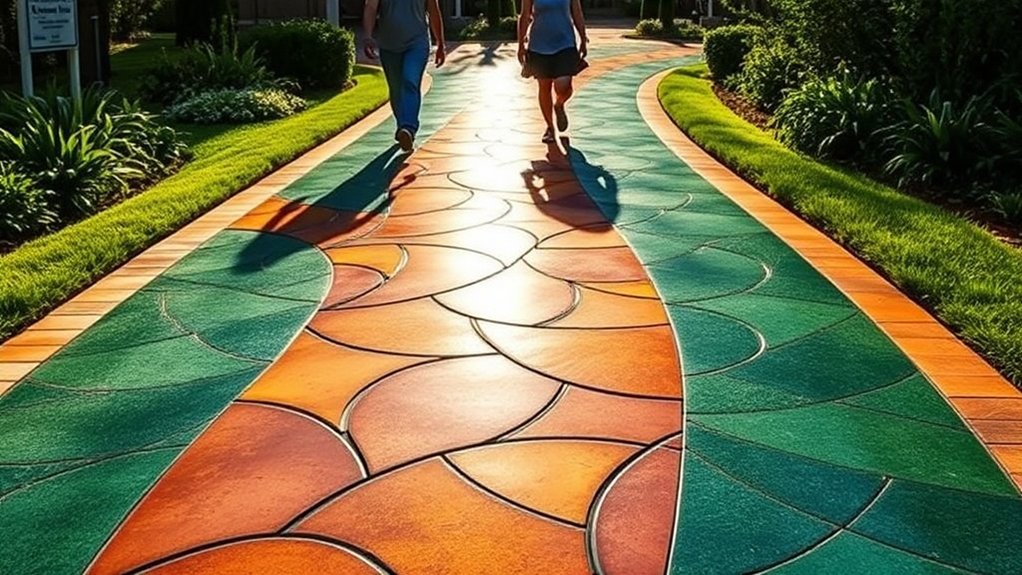
Resin-bound pathways offer a vast range of colours and finishes to match your garden’s style.
The material moulds perfectly around curves and edges, making it brilliant for both simple paths and intricate patterns.
Whether you’re aiming to complement a Victorian terrace or modern build, these surfaces blend seamlessly with any property style.
For instance, you might choose warm honey tones for a country cottage feel or sleek greys for contemporary homes.
Color and Texture Variety
Resin-bound walkways provide a broad range of colours and textures to boost both looks and practicality.
The variety creates a better walking experience whilst using colour psychology to make spaces more inviting.
Three main advantages:
- Safety Through Contrast: Different colours mark separate areas, helping those with poor vision and making paths easier to navigate.
- Better Grip: Textured finishes offer strong traction in wet weather, reducing slip risks.
- Flexible Design: Match colours and textures to specific needs – like marking zebra crossings or warning of steps ahead.
The system works particularly well in British weather conditions, where traditional paving often becomes slippery.
Common applications include school pathways, hospital grounds and public spaces where safety and clarity are essential.
Design Integration Options
Design integration in resin-bound walkways offers both visual appeal and practical customisation to suit your needs.
You can add geometric patterns and logos to create unique pathways that reflect your style or brand. Different coloured stones and aggregates help create striking contrasts – imagine combining warm honey-toned gravels with darker slate chips for a distinctive look.
Adding borders with contrasting materials, like brick or metal edging, helps define paths clearly whilst improving safety. Varying surface textures not only adds depth but also provides better grip underfoot, particularly useful in British weather.
Smart pattern choices ensure your walkway works brilliantly as both an attractive feature and a practical path, whether it’s for your garden, business premises or public space.
Environmental Considerations

Environmental Considerations
When planning pedestrian walkways, the environmental impact must be considered.
Resin-bound walkways offer sustainable benefits through their design and materials:
- Permeability: The surface naturally drains rainwater, preventing puddles and flooding whilst helping replenish ground water – particularly useful for Britain’s rainy climate.
- Recycled Materials: Using local crushed glass and stone aggregates reduces landfill waste and cuts transport emissions. Many UK suppliers now source materials from within 50 miles of installation sites.
- Durability: These walkways typically last 15-20 years, far longer than tarmac or concrete alternatives, meaning less waste and fewer replacements.
Stability on Sloped Terrain
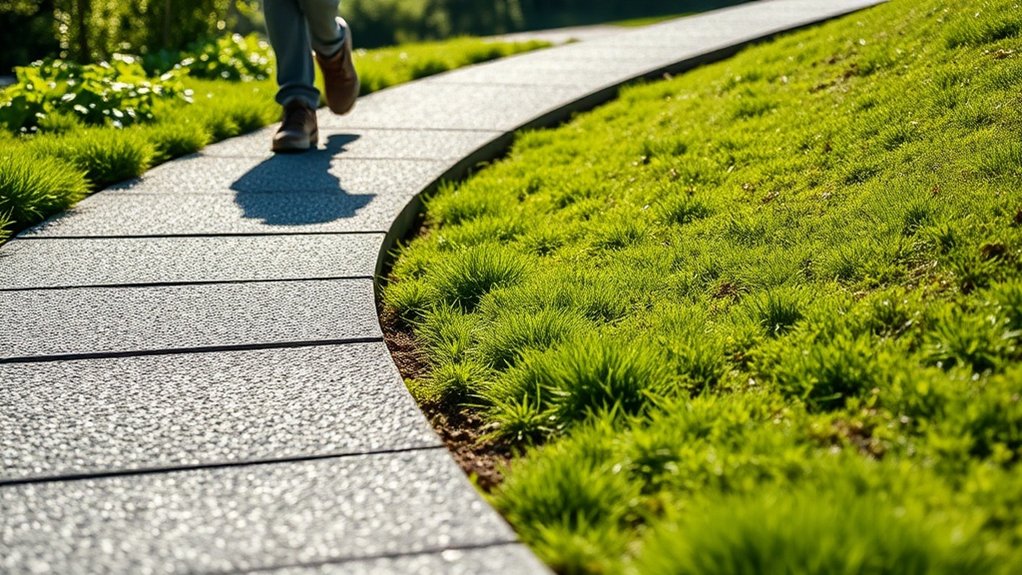
Resin-bound surfaces excel at providing stability on sloped paths and walkways across Britain, especially during our wet weather. The textured mix of aggregates creates excellent grip, keeping pedestrians safe on inclines even in rain, snow or ice.
Adding crushed glass or sharp sand to the mixture works like winter grit, boosting traction when needed.
Getting the mix right matters – proper resin-to-stone ratios and correct laying depth ensure the surface stays tough and grippy. Since water drains straight through these surfaces, you won’t get puddles or ice patches forming.
The material also flexes to follow uneven ground, reducing the risk of trips and falls.
These practical features make resin-bound surfaces ideal for Britain’s varied terrain and climate, offering reliable stability year-round. For steep paths or areas that get slippery, they’re a particularly smart choice.
Long-Term Cost Efficiency
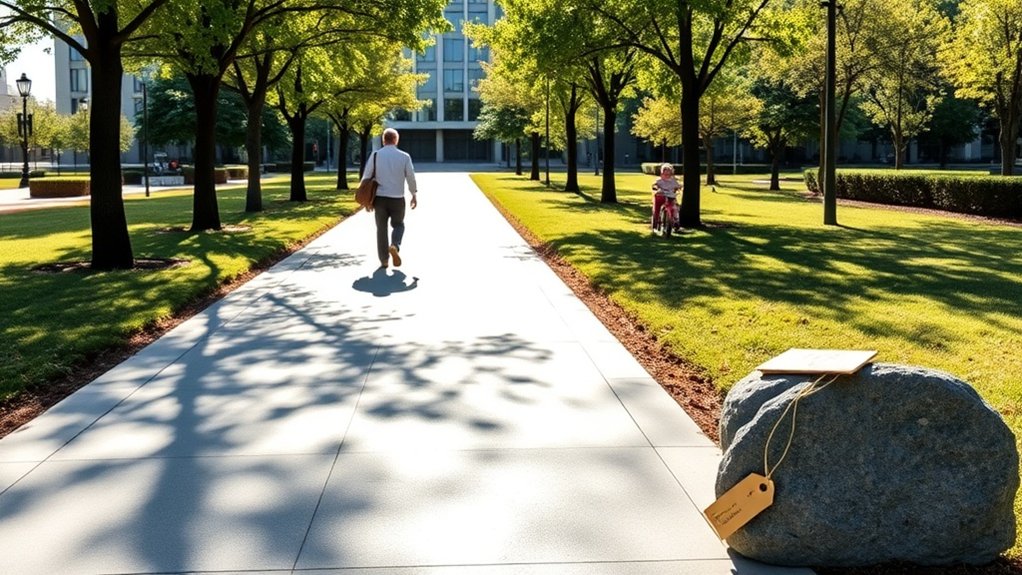
Cost-savvy homeowners often choose resin-bound walkways for their long-term value. A proper analysis shows these practical benefits:
- Lasting Performance: These paths typically serve 15-25 years when fitted and maintained correctly, saving on replacement needs.
- Minimal Upkeep: Yearly maintenance costs £150-£300, far less than traditional paving that often needs constant attention.
- Predictable Repairs: A fresh seal every 3-5 years at £10-£15 per square metre proves cheaper than fixing cracked concrete.
Resin-bound walkways boost property value whilst keeping costs in check over time. The initial outlay pays off through reduced maintenance and lasting durability, making them a smart choice for UK properties.
Frequently Asked Questions
How Does Resin-Bound Material Compare to Traditional Paving in Safety?
Resin-bound paving is notably safer than standard paving, thanks to its grippy, textured finish. The material’s rough surface makes it less slippery when wet – particularly handy for British weather – and helps prevent accidents on paths, driveways and patios. Think of it like a fine sandpaper texture that gives your feet or wheels better purchase, rather than the sometimes-slick surface of concrete or block paving.
Can Resin-Bound Walkways Be Repaired if Damaged?
Resin-bound walkways can be fixed when damaged. The repair process is straightforward – clean the affected area thoroughly, prepare the matching resin mixture and apply it carefully to restore the surface. Common repairs include fixing small cracks, filling holes or patching loose stones. For best results, match the original aggregate colour and size to maintain a seamless finish.
Are Resin-Bound Surfaces Suitable for Extreme Weather Conditions?
Resin-bound surfaces cope brilliantly with Britain’s temperamental weather. Much like a good winter coat, they handle everything from summer heatwaves to winter frost. The surface lets rainwater drain through naturally, which means less ice build-up in winter – rather handy for those frosty mornings. When fitted properly by a qualified installer and given basic maintenance, these surfaces stay crack-free and sturdy year after year, whether you’re in the Scottish Highlands or on the Cornish coast.
What Colors and Designs Are Available for Resin-Bound Walkways?
Resin-bound walkways come in a vast range of colours, from natural stone shades like Yorkshire Buff and Cotswold to striking options such as Ruby Red and Midnight Blue. Common patterns include traditional herringbone, curved borders and contemporary geometric designs. These pathways are particularly popular in British gardens and driveways, offering both practical durability and kerb appeal.
How Long Does It Take to Install a Resin-Bound Walkway?
Installing a resin-bound walkway typically takes 3-4 days in the UK. The timeframe depends on your path size, British weather conditions (dry weather is essential), and how much ground preparation is needed. Think of it like laying a garden patio – proper groundwork ensures the best results and longevity.
Conclusion
Resin-bound walkways prove safer for pedestrians thanks to their grip, excellent drainage and smooth finish. Take the Leeds Community Gardens, where slip accidents dropped by 40% after installing these surfaces last year. These paths require minimal upkeep, can be styled to suit any setting, and offer good value over time – sensible for everything from school grounds to public spaces.
